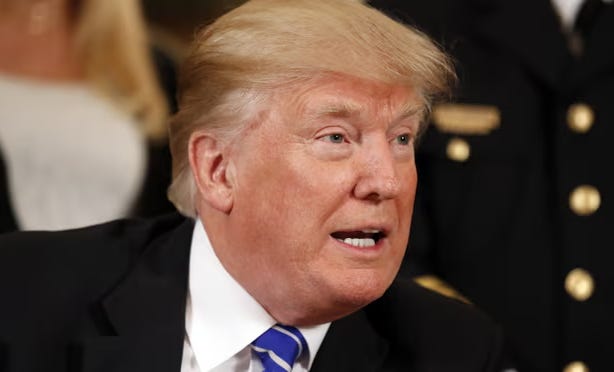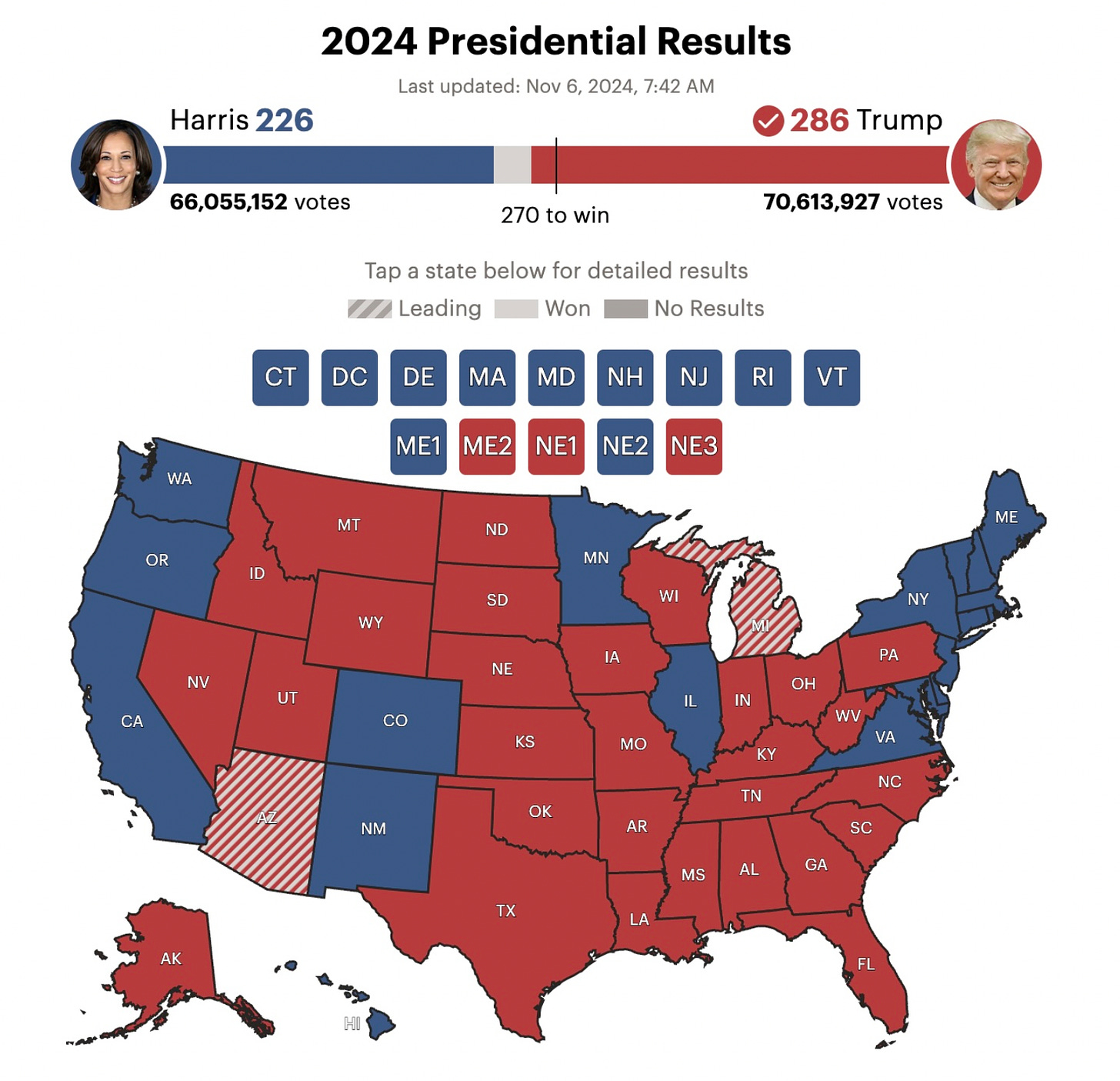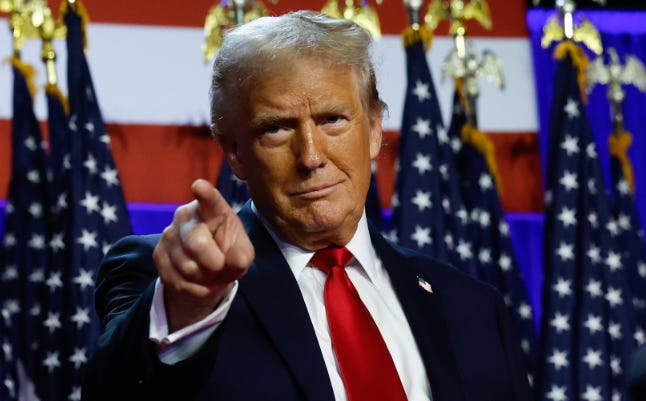It is hardly a surprise that Trump won the election or that the Republicans gained control of the Senate. It is a surprise that as of this writing it seems fairly certain that Trump will have won the popular vote by several million, which was not on most people’s expectation radar.
It is likely that most of the 24,000 people who subscribe to the Edgy Optimist did not vote for Donald Trump. It is also likely that many of you reading this are not at all happy about the outcome or about the prospect of the next years of Trump, especially after the experience of 2017-2020. And to be clear, I didn’t support Trump and would have voted for almost anyone other than him. I think he is a selfish chaos monkey and that the next 4 years will be a needless waste of our collective energy as he and his administration attempt to push the bounds of what the executive branch can do.
What I am about to say will probably not be what you want to hear. Some of you may well choose to unsubscribe. I hope not. I hope you will be open to these views, now and going forward, whether you agree on all or most counts.
I think the fears about Trump are vastly exaggerated when it comes to him and simultaneously vastly underappreciated when it comes to us. In short, our primary issue isn’t Trump—it’s a culture that has convinced itself of an exceptionalism that isn’t merited. The United States is a magnificent country with unique freedoms and opportunities. It is also and always has been a messy, large, fractious and violent country. Donald Trump is not unique except in his level of political success—a success that is partly a function of his actions and partly a result of his adversaries on the Left. He is an American huckster, and the most successful one in our history.
I spent considerable time in columns between 2016 and 2020 warning against the relentless and obsessive focus on Trump’s character, yet many Democrats and a large percentage of the commentariat have fueled Trump’s resurrection by demonizing him and his supporters and by pursuing legal action against him.
Even if he is all that his critics say he is, and even if he did things that should have legal consequences, pursuing those lines of attack was politically stupid and led to exactly the opposite of weakening him. There is a reason many countries provide degrees of immunity from prosecution for high officials: there is no way that leaders who have been democratically elected can be subsequently prosecuted without a fair number of people perceiving that prosecution as politically motivated, which in turn weakens the justice system.
There has always been a peculiar and problematic phenomenon with Trump and those who oppose him: his words are treated as tantamount to actions. That is simply not true. It is a profound mistake to equate words to actions, and to reach back into history to argue that hateful words are an inevitable prelude to the end of democracy and the erosion of freedom. The fact is: sometimes yes, sometimes no. Hateful words can create a climate for destructive action, no doubt, but words are often not precursors to action.
The obsession with what Trump says has long clouded judgment. His words and instincts may suggest authoritarian inclinations, but the reality of 2017-2020 was that his administration behaved much like any other mildly corrupt administration and the policies that ensued may have been deeply objectionable to some but were nonetheless lawful and democratic. Many are convinced that in a second term, the “guardrails” will be gone, that the administration will be staffed by yes-men and yes-women. But the guardrails are far more extensive than who roams the hall of the stolid executive branch building that dot Washington D.C. They exist in culture, and in the decentralized nature of power domestically in the United States.
That is another confusion around Trump: implementing policies that are deeply objectionable to many is not the same thing as authoritarianism or fascism. Not even close. Ending a legal right to abortion may be awful, but it was just as legal as establishing a right to abortion. Tariff barriers may have usurped the rightful role of Congress to tax and regulate trade, except that Congress has repeatedly passed laws delegating some of that authority to the executive branch. Banning certain classes of immigrants can and has always been justified on national security grounds, even if that is a cover for racism.
Democracy is not a panacea for human cruelty and ugliness. What the Trump era has demonstrated and will likely continue to demonstrate is that American democracy is not this neat pretty thing that produces only good outcomes. That is a myth, cultivated by Americans across generations and across the ideological spectrum. And it is a myth particularly potent among liberal educated elites.
What remains true is that there is no comparison between the United States as an open society and Russia, China, Iran, Egypt, Honduras, Hungary, Turkey, and dozens of other countries. There is no policing of thought. There is no active suppression of individual life, and few constraints on how to live. That of course varies state by state, especially in terms of a woman’s right to choose but with few exceptions, the United States remains amongst the freest countries in the world in terms of how government interferes with individual behavior.
There are fears that is about to change. But until it has changed, it has not. Until there is tangible and consistent translation of hateful words into actions designed to coerce the public, the fears are as ephemeral as the words themselves.
I know many of you will object. What about mass deportations? Yes, that is a brutal use of federal power, but 12 million people were deported during the Clinton presidency, 10 million under Bush, and 5 million during Obama’s first years. Trump’s goal of one million deportations a year may be couched in more nativist rhetoric, but it matters little to the person being deported by federal agents whether that is being done by a smiling Democrat or a snarling Republican.
Trump in 2016 should have been a slap in the face to those who held illusions that American democracy is genteel and orderly and had fulfilled its promises to its own citizens. Trump in 2024 should be another harder slap that people care about the material conditions of their daily lives far more than they care about how politicians speak or even how they behave. A vast number of people voted for Trump in spite of Trump, because they were frustrated with inflation and the aftermath of the pandemic and a sense of a world slipping out of control. Demonizing all of those voters as complicit in Trumplandia is a mistake.

In a country of 330 million, particularly one where everyone is free to speak and advocate for whatever they choose, there are going to be a lot of people who strike a lot of other people as nuts. After Richard Nixon resigned in August of 1974, he still had a 24% approval rating, and with each passing year that began to climb higher. He may have been disgraced but tens of millions of people stood by him.
Finally, we need to recognize that the president is not nearly as powerful as the narrative and the focus would suggest, even with the recent Supreme Court ruling on presidential immunity from prosecution for “official acts.” If the pandemic showed anything, it’s that even in a national emergency, state governments retain the bulk of power over our daily lives, a power which is itself rarely usable other than in extreme circumstances. The president is one locus of power, but hardly the sole one and far more constrained than most think. Trump might test how far that extends, but until jackboots are pounding on my door for what I say or do within the law, the fear of what might happen is simply that: fear.
Acting as if the line between fear and reality is short and straight is the greatest mistake we can make. Acting as if words are actions is equally dangerous. The real challenge of democracy lies in balancing policies with the varied wants and needs of the people, especially when those desires often conflict within a large and diverse society. Donald Trump is the duly elected president of a functional messed up democracy. His faults are known and have been endlessly parsed for 8 years.
Going forward, we would do well to focus on what gets done and not on the character of whoever is doing it. And we would do well to remember that we are living in normal times, not aberrant ones. Periods of calm and peace are abnormal; long stretches of tumult and contestation are the norm. We can strive for something better and should, but we should shed the illusions of who we have been and who we are.





A very good talking to those of us prone to freaking out. I’m tired of being angry, negative and anxious. Time to stop tantrumming and deal with what is. Hopefully it’s less destructive than we fear.
I get it - thank you for a calm and thoughtful response. I don't think you're dismissing the very real "bad" behavior that we experienced (and are likely to again) - but, in many ways, what I see you saying is that it's up to us to step away from the click-bait madness and not live in fear or feel helpless.